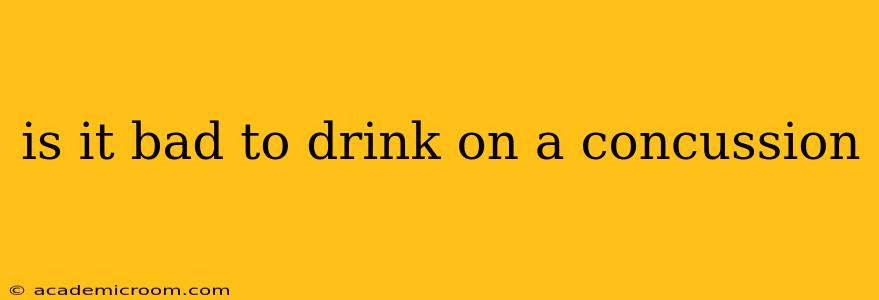A concussion, a type of traumatic brain injury (TBI), disrupts normal brain function. While the effects can vary greatly from person to person, one thing remains consistent: alcohol consumption after a concussion is strongly discouraged and can significantly worsen recovery. This is because alcohol interacts negatively with the brain's healing process in several ways.
How Does Alcohol Affect Concussion Recovery?
Alcohol is a central nervous system depressant. After a concussion, your brain is already vulnerable and working hard to repair itself. Adding alcohol further depresses brain function, potentially hindering this vital recovery process. The effects can include:
- Increased Inflammation: Alcohol can increase inflammation in the brain, exacerbating the existing inflammation caused by the concussion. This increased inflammation can prolong healing time and potentially lead to more severe long-term effects.
- Delayed Healing: Alcohol interferes with the brain's ability to repair damaged cells and tissues. This delay in healing can increase the risk of long-term cognitive problems, such as memory loss, difficulty concentrating, and headaches.
- Exacerbation of Symptoms: Common concussion symptoms like headaches, dizziness, nausea, and fatigue can be significantly worsened by alcohol consumption. The combination can lead to a dangerous cycle of worsening symptoms, hindering recovery.
- Increased Risk of Complications: In some cases, alcohol consumption after a concussion can increase the risk of more serious complications, such as prolonged post-concussion syndrome (PCS). PCS involves persistent symptoms that significantly impact daily life.
- Interaction with Medications: If you're taking prescribed medications for pain or other concussion symptoms, alcohol can interact negatively with these drugs, potentially causing adverse effects.
What Should You Do Instead of Drinking After a Concussion?
Focus on strategies that promote healing and recovery. These include:
- Rest: Getting adequate rest is crucial for brain healing. Avoid strenuous activities and allow your brain time to recover.
- Hydration: Drink plenty of water to stay hydrated. Dehydration can worsen concussion symptoms.
- Healthy Diet: Nourish your body with a balanced diet rich in fruits, vegetables, and whole grains.
- Cognitive Rest: Limit screen time, reading, and other mentally demanding activities. Gradually increase these activities as your symptoms improve.
- Medical Supervision: Follow your doctor's recommendations carefully. They can provide personalized advice and monitor your progress.
How Long Should You Avoid Alcohol After a Concussion?
There's no single definitive answer to this question. The duration of alcohol avoidance depends on the severity of the concussion and individual recovery progress. It's best to consult your doctor or a healthcare professional. They can assess your specific situation and provide guidance on when it might be safe to resume alcohol consumption, if at all. Many doctors recommend abstaining from alcohol for several weeks or even months after a concussion.
Can Alcohol Mask Concussion Symptoms?
Yes, alcohol can temporarily mask some concussion symptoms, making it seem like you're recovering faster than you actually are. However, this is deceptive. The underlying brain injury remains, and the alcohol is simply suppressing the symptoms, not addressing the root cause. This can lead to delayed diagnosis and treatment, potentially worsening long-term outcomes.
What are the Long-Term Effects of Drinking Alcohol After a Concussion?
Long-term effects of alcohol consumption after a concussion can include prolonged post-concussion syndrome (PCS), chronic headaches, cognitive impairment (difficulty with memory, concentration, and executive function), and increased risk of depression or anxiety. The severity of long-term effects varies greatly depending on the severity of the concussion and the amount of alcohol consumed.
Is it Okay to Drink Beer After a Concussion?
No. The same principles apply to all alcoholic beverages. Beer, wine, and liquor all contain alcohol, which poses the same risks to concussion recovery. Avoid all alcohol until cleared by your doctor.
In conclusion, avoiding alcohol after a concussion is crucial for optimal recovery. Prioritize your brain's health by focusing on rest, hydration, and medical guidance. Always consult with a healthcare professional for personalized advice and to monitor your progress. Your health and long-term well-being depend on it.
